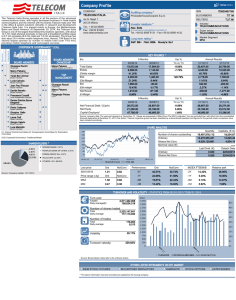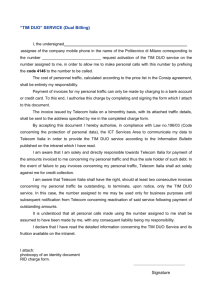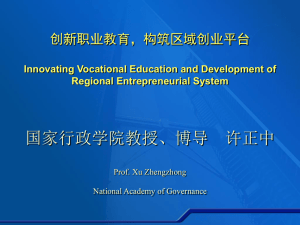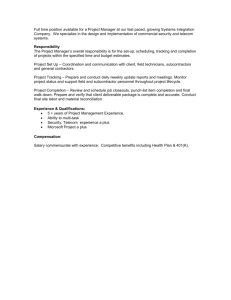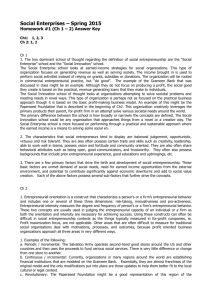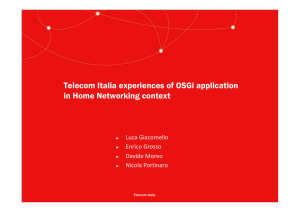DOC - Fondazione Rosselli
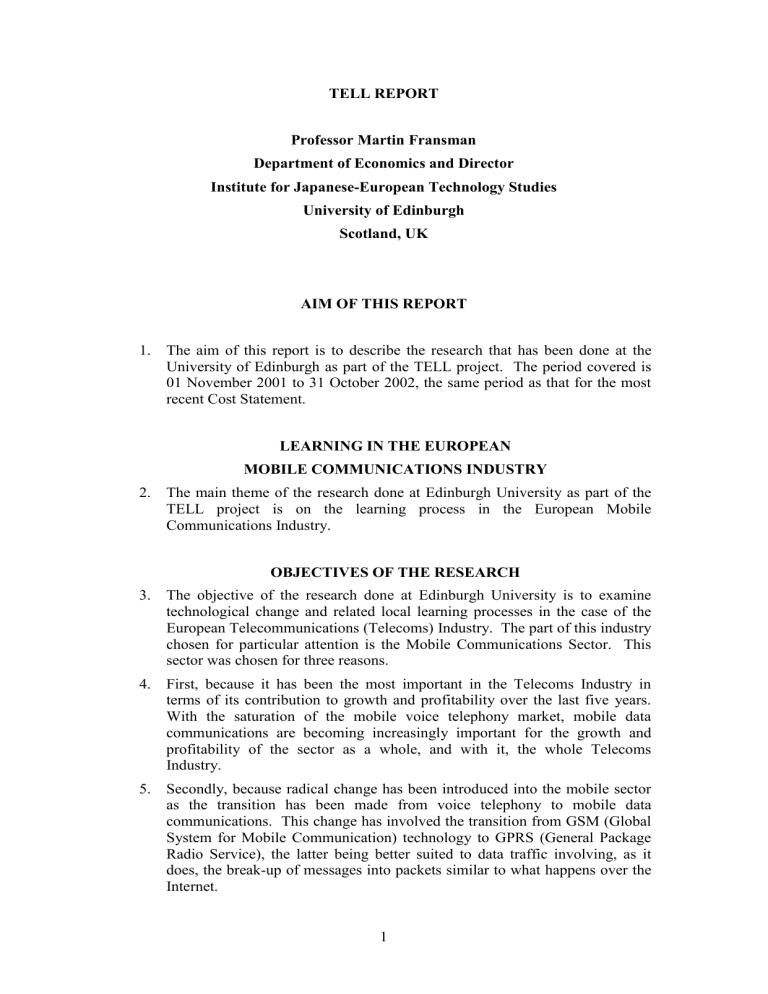
TELL REPORT
Professor Martin Fransman
Department of Economics and Director
Institute for Japanese-European Technology Studies
University of Edinburgh
Scotland, UK
AIM OF THIS REPORT
1.
The aim of this report is to describe the research that has been done at the
University of Edinburgh as part of the TELL project. The period covered is
01 November 2001 to 31 October 2002, the same period as that for the most recent Cost Statement.
LEARNING IN THE EUROPEAN
MOBILE COMMUNICATIONS INDUSTRY
2.
The main theme of the research done at Edinburgh University as part of the
TELL project is on the learning process in the European Mobile
Communications Industry.
OBJECTIVES OF THE RESEARCH
3.
The objective of the research done at Edinburgh University is to examine technological change and related local learning processes in the case of the
European Telecommunications (Telecoms) Industry. The part of this industry chosen for particular attention is the Mobile Communications Sector. This sector was chosen for three reasons.
4.
First, because it has been the most important in the Telecoms Industry in terms of its contribution to growth and profitability over the last five years.
With the saturation of the mobile voice telephony market, mobile data communications are becoming increasingly important for the growth and profitability of the sector as a whole, and with it, the whole Telecoms
Industry.
5.
Secondly, because radical change has been introduced into the mobile sector as the transition has been made from voice telephony to mobile data communications. This change has involved the transition from GSM (Global
System for Mobile Communication) technology to GPRS (General Package
Radio Service), the latter being better suited to data traffic involving, as it does, the break-up of messages into packets similar to what happens over the
Internet.
1
6.
Thirdly, because the transition from mobile voice to mobile data has simultaneously opened up new entrepreneurial opportunities, opportunities that have required new learning processes.
7.
More specifically, the first-generation of data services in Europe has involved
‘texting’ using SMS (Short Message Service 1
) messages. However, SMS texting has in effect provided a new innovation platform , that is a basis upon which a new range of innovative services can be developed by new entrepreneurial firms or existing firms. (Indeed, one of the reasons this area is of particular interest is that most of the firms that have emerged over the last few years are new entrepreneurial, technology-based firms that potentially will make an important contribution to the growth of mobile communications and associated economic activities in Europe.) Examples of such new innovative services are location-based services (often referred to in the media) whereby people can receive information contingent on their location. One example is information about the recipient’s favourite kind of restaurant available in the area in which the recipient at the time happens to be. Another example, also using texting, is the start-up company in Scotland that provides a doctor, who is out on call during a time when his/her surgery is closed, with the patent’s medical records via a GPRS mobile phone.
8.
A further objective of the research was to test an important policy-oriented hypothesis. This hypothesis was that very few entrepreneurial mobile start-up companies would be found in Scotland since this region lacks large global mobile companies such as mobile operators or mobile equipment makers.
(More accurately, although these kinds of companies sell their services and products in Scotland, neither their headquarters nor their R&D activities are located in Scotland.) Accordingly, the hypothesis suggests, Scotland will not have the kind of entrepreneurial activity in the mobile field to be found in other mobile-intensive locations such as Sweden/mainly Stockholm,
Finland/mainly Helsinki, or Japan/mainly Tokyo. Studies done by academic colleagues working on mobile communications in these three regions have shown that an important source of growth of entrepreneurial new mobile firms has been transfer of knowledge via the movement of people from existing large mobile companies (such as Ericsson and Telia in Sweden,
Nokia and Sonera in Finland and NTT DoCoMo and the Japanese equipment makers in Japan.)
RESEARCH UNDERTAKEN ON START-UP
ENTREPRENEURIAL MOBILE COMPANIES
9.
The first part of the research involved a detailed search for new entrepreneurial start ups in the mobile area in Scotland. Data bases and business newpapers were examined for relevant information and discussions were held with numerous well-informed people. It was soon fortunately discovered that the regional government-funded economic development agency, Scottish Enterprise, was also interested in start-up companies in mobile and had information on a number of them
1 SMS is a method within GSM-telephony for sending short messages from and to mobile phones.
2
10.
Interviews involving the entrepreneurs who established the start-ups were begun in order to better understand the learning processes involved, particularly during the start-up phase and the first few years of operation.
These interviews focus on issues such as the entrepreneur’s previous training and job experience, how the entrepreneur became interested in and knowledgeable about the mobile industry, and the activities that the entrepreneur engaged in in order to start the company and run it in the first few years of its existence.
LEARNING IN LARGE INCUMBENT
EUROPEAN TELECOMS COMPANIES
11.
One of the main characteristics of the Mobile Communications Industry in
Europe (as in other pars of the world) is that it is the mobile subsidiaries of the large incumbent telecoms operators that tend to dominate domestic mobile markets. (The notable exception is Vodafone, a pure-play British mobile company that began as a defence contractor and went on to become the largest global mobile company.) An understanding of the growth and learning processes in small entrepreneurial start-up companies producing mobile content and applications therefore requires and understanding of the relationship between these companies and the large incumbents.
TELECOM ITALIA:
FINANCIAL RESTRUCTURING, MOBILE COMMUNICATIONS
AND CHANGING R&D PROCESSES
12.
In order to understand the large incumbent telecoms operators better the case of Telecom Italia was chosen for further detailed study. Attention focused on three aspects of Telecom Italia’s recent history. The first is the radical financial restructuring of the company as it was acquired by a number of private sector Italian companies. The second is the role of mobile communications in Telecom Italia via its Telecom Italia Mobile (TIM) subsidiary. The third is the radical changes that have occurred in the company’s strategic objectives and organisation of R&D.
RESEARCH UNDERTAKEN ON TELECOM ITALIA
13.
The result of this research has been a long paper titled Telecom Italia:
Financial Restructuring, Mobile Communications and Changing R&D
Processes . This paper is available on the TELL website.
NEXT STEPS
14.
A number of following research steps are now in progress, corresponding to the period of the next Cost Statement. These include the following: o complete start-up interviews
3
o prepare report on the extent of mobile start-ups in Scotland and the processes of learning that they have gone through in order to successfully launch and survive their first years of operation. o examine the role played by government institutions in facilitating the emergence and growth of these start-ups, particularly the role of Scottish Enterprise. o examine the role played by Scottish universities as an explanatory factor in accounting for the emergence and development of these firms.
CONCLUSION
15.
This study of Mobile Communications in Europe will make an important contribution to the TELL research. The main reason is that mobile communications is one of the most important growth areas in the European
ICT industry and makes a significant contribution, through its facilitation of mobility, to the European Information Society.
4

